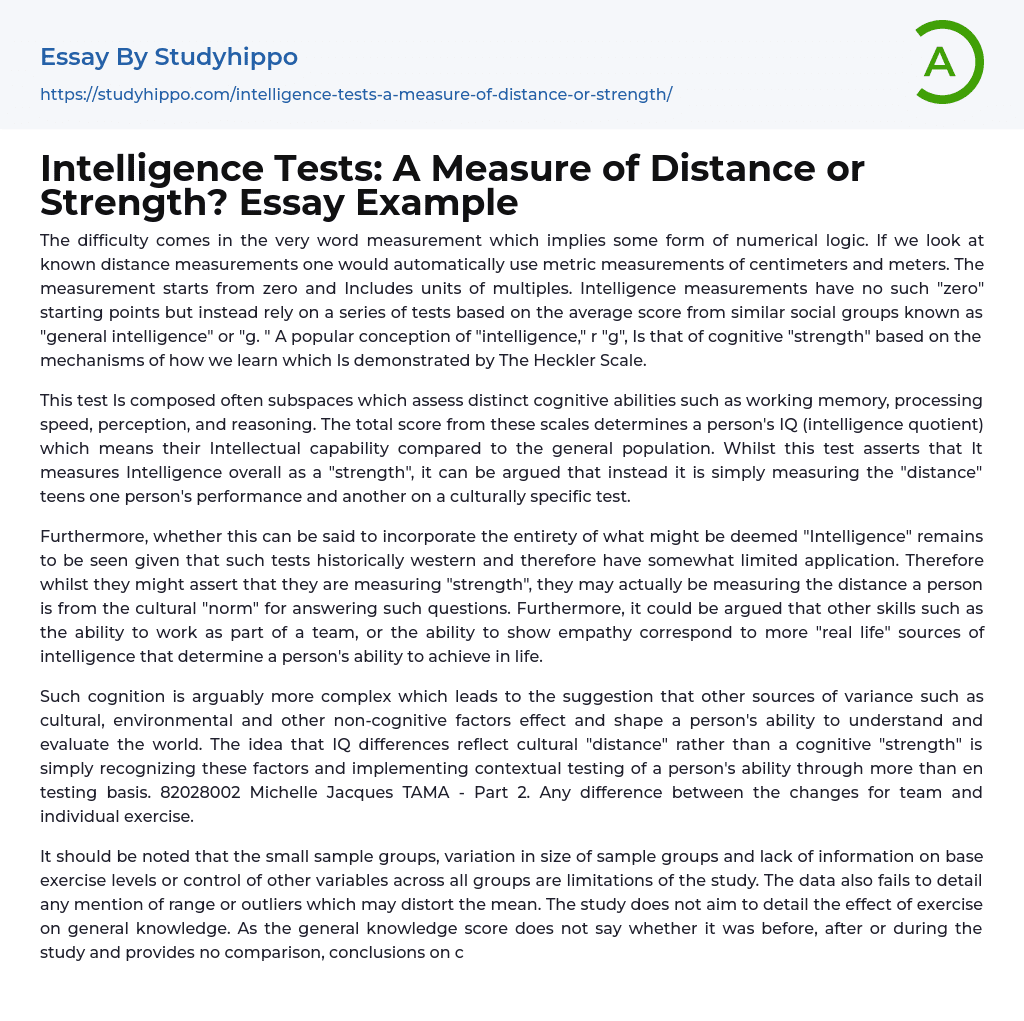

Intelligence Tests: A Measure of Distance or Strength? Essay Example
Measurement is difficult due to the use of numerical methods. When measuring distances, metric units such as centimeters and meters are typically employed, with progression starting from zero and increasing in multiples. However, intelligence measurements differ because they lack a definitive starting point or "zero." Instead, these measurements rely on tests that compare individuals to the average score of similar social groups. This average score is commonly known as "general intelligence" or "g." One common interpretation of intelligence or "g" is the cognitive "strength" demonstrated by learning mechanisms, as evidenced by The Heckler Scale.
The assessment measures various cognitive abilities, such as working memory, processing speed, perception, and reasoning. An individual's intelligence quotient (IQ) is determined by their overall score on these scales. This score compares their intellectual capacity to that of the general population. However, some argue that t
...his test primarily gauges the difference in performance on a culturally specific exam among individuals rather than measuring true intelligence.
The complete understanding of the concept of "Intelligence" remains uncertain due to its historical association with Western culture, which may not be universally relevant. Consequently, instead of assessing true "intelligence," these tests might actually gauge the extent to which individuals differ from cultural norms in their responses. Additionally, some contend that abilities such as teamwork and empathy hold greater practical importance in determining an individual's achievements in life.
The text highlights the intricate nature of cognition, which can be influenced by various elements such as culture, environment, and non-cognitive factors. It proposes that discrepancies in IQ scores may not necessarily reflect variations in cognitive ability but rather disparities in cultural comprehension. The text acknowledges the
importance of conducting contextual assessments that surpass standardized tests. Additionally, it references Michelle Jacques' research on contrasting effects of group and solo physical activity.
The limitations of the study include small sample groups, variation in size of sample groups, and lack of information on base exercise levels or control of other variables across all groups. The data also does not mention the range or outliers, which could affect the mean. Additionally, the study does not focus on the effect of exercise on general knowledge. Since the general knowledge score does not specify when it was measured or provide any comparison, it is not possible to draw conclusions about any change or effect.
According to the data, it appears that the control group had higher average performance compared to the other groups. The increase in IQ depends on the initial IQ value influenced by sports. Initially, all three groups had an average IIS within a range of three points. The results indicate that the "team sport" group saw an average improvement of seven points, while the individual training group experienced an improvement of two points, and the control group had an improvement of one point. This suggests that there is a natural variation in a group's IQ on any given day of approximately one point. Therefore, it is possible for training to potentially enhance the individual groups' IQ by an average of one to three points and boost the team sport group's IQ by six to eight points.
In team sport, additional participation enhances IQ more than in individual sports. Moreover, I found Part 3 of the exercise enjoyable and believe that collaborative forums are a
fantastic way to familiarize oneself with fellow students. These forums provide support and act as a safety net for asking questions that might seem silly but are actually shared by others. They have helped me stay on track and I find the various responses quite intriguing.
- Academia essays
- Higher Education essays
- Language Learning essays
- Studying Business essays
- Education System essays
- Study essays
- First Day of School essays
- Scholarship essays
- Pedagogy essays
- Curriculum essays
- Coursework essays
- Studying Abroad essays
- Philosophy of Education essays
- Purpose of Education essays
- Brainstorming essays
- Educational Goals essays
- Importance Of College Education essays
- Brown V Board of Education essays
- The Importance Of Higher Education essays
- Online Education Vs Traditional Education essays
- Academic And Career Goals essays
- Academic Integrity essays
- Brown Vs Board Of Education essays
- Distance learning essays
- Technology in Education essays
- Vocabulary essays
- Writing Experience essays
- Importance of Education essays
- Early Childhood Education essays
- Academic Degree essays
- Academic Dishonesty essays
- School Uniform essays
- Academic writing essays
- Cheating essays
- Bachelor's Degree essays
- MBA essays
- College Life essays
- Grade essays
- Diploma essays
- Phonology essays
- Sentence essays
- Filipino Language essays
- Pragmatics essays
- Millennium Development Goals essays
- History Of Education essays
- Graduate School essays
- Middle School essays
- School essays
- Special Education essays
- University essays



